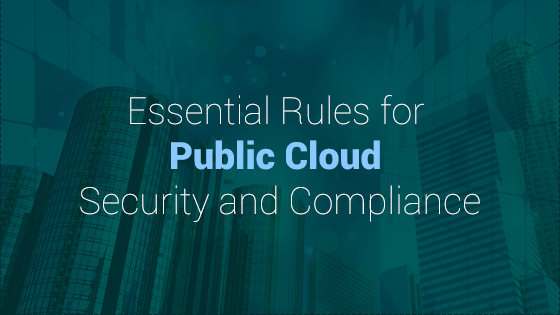Essential Rules for Public Cloud Security and Compliance
Public clouds are on track to become a common part of everyday business. They are already being used by most major corporations in the world and are starting to become the norm in middle sized enterprises as well. What this means is that we have to rethink our data security measures. The whole infrastructure and vision behind most of the databases being used by companies is changing. We cannot use the same rules that we did before because many of them do not even apply anymore. We no longer have access to the physical servers and a lot of the security tasks are out of our hands as well. Here are the essential rules to follow for public cloud security and compliance.
Understand what the public cloud secures
Companies like Amazon, Microsoft, and IBM have spent millions and have employed the sharpest minds possible to make their public clouds secure. A public cloud is much more secure when compared to a normal in-house data infrastructure. However, it is important to note that these services do a great job at ensuring that no one forcibly gains access to their servers – your servers may still be a different measure. This is a lesson many companies have learnt the hard way. It is still possible for hackers to steal the credentials for cloud access from your employees through key loggers, as well as simple social hacking. Think of it like this – public clouds are like bank lockers. They have excellent site security and it is almost impossible for anyone to break into it. However if you keep your key unsecure, then anyone may steal the key and access your locker.
Increased security measures are required for cloud access
You need to increase the security level within your company when you switch to a public cloud. It is important to make sure that your employees have secure passwords and that the passwords are changed every few weeks. You also need to up the security on the devices of your employees. Make sure they are safe against threats like ransomware.
You need automation
When the company is being run on an in-house system, it is normal to have someone monitoring the system 24/7. It is important to have someone in the same rule for public clouds as well, however, it isn’t going to be enough. Public clouds have many fantastic features which your employees will love. They will be using the public cloud much more than they used the in-house system. This means you need to automate your security processes for advanced monitoring. There are many services available for all public cloud. It doesn’t matter if you have AWS, Azure, or IBM’s cloud services – there will be a monitoring service available for it.
Compliance needs to be automated as well
Compliance is one of the major areas of concern for many companies that want to move to the cloud. The industry norm was to hold periodic compliance checks to ensure that nothing was off the mark. This isn’t enough for public clouds. You need to ensure that all your services that are running through the cloud have compliance built into their DNA. If your company works with financial data or medical data you will be aware of the standards you need to comply to. Make sure that the solutions your company uses are compliant before you find that your company has been breaking a rule for months without even knowing about it.
Compartmentalize data access
The best way to ensure that your data is secure is to make sure permissions are set accordingly. No one should have access to any part of the cloud that is not required for their job role. Public clouds can be accessed from anywhere. This is an advantage of public clouds but it can also be a disadvantage if you do not manage credentials and access properly. Someone can access your cloud through a stolen device or password and access confidential information. All proper public clouds have great credential and access software built-in; make sure it is being used properly by your system administrators.
Conclusion
Public Clouds are a relatively new technology. We are sure that the role of public cloud security manager will start becoming normal in the IT departments of most companies in a few years. The industry is coming to terms with public cloud’s security requirements and developing the proper security infrastructure to ensure everything is kept secure. The only way to ensure nothing bad happens is constant vigilance and compliance.



